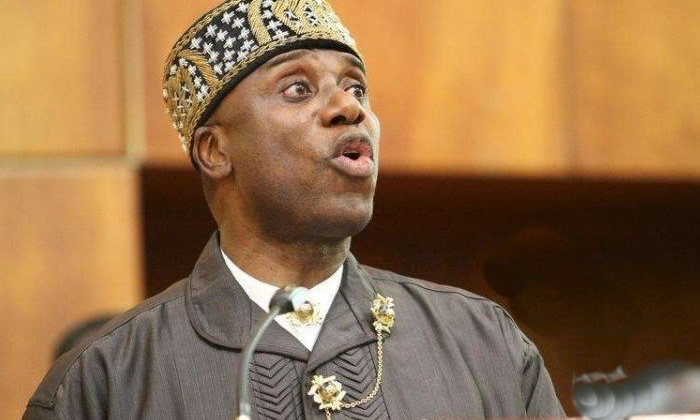Former Rivers State Governor Rotimi Amaechi has ignited controversy with claims that the ongoing feud between the suspended Governor Siminalayi Fubara and his predecessor, FCT Minister Nyesom Wike, revolves around the distribution of state funds.
In a candid interview with DW Africa on Saturday, Amaechi didn’t mince words, asserting that the dispute boils down to a disagreement over “money sharing.”
Amaechi challenged the two leaders to publicly address the nature of their conflict, questioning their silence on the matter.

He expressed concern over the apparent public apathy towards potential corruption, stating, “Nigerians don’t dislike corruption anymore. I’ve not seen anybody on the street querying what the problem is. Can both of them speak to the public and tell us what the problem is?”
Beyond the interpersonal conflict, Amaechi also raised serious concerns about the imposition of emergency rule in Rivers State, labeling it unconstitutional and an affront to democracy.
He argued that President Bola Tinubu’s actions bypassed the established procedures for removing a governor from office, as outlined in Section 188 of the Constitution, which stipulates removal through death, resignation, or impeachment.
“They have imposed military rule on us,” Amaechi declared, highlighting the gravity of the situation. He argued that the President’s actions create a dangerous precedent, undermining the stability of democratic processes.
Amaechi further speculated on the President’s motivations, suggesting that the situation in Rivers State is intertwined with the upcoming 2027 general elections. He posited that the President might be seeking to consolidate power by removing governors who may not align with his political agenda.
“Rumours are everywhere that if any governor is not careful, the president will remove you,” Amaechi revealed, painting a picture of political maneuvering and potential intimidation. “So the Rivers issue is about sharing money and 2027 politics.”
The former governor also questioned the justification for the emergency rule, citing the President’s rationale of a pipeline explosion as a sign of instability and insecurity. Amaechi pointed to other regions of the country grappling with insecurity, asking why similar measures haven’t been implemented elsewhere.
He specifically mentioned the North East, North West, South East, and even other parts of the South South, highlighting the seeming inconsistency in the President’s approach. He argued that using security concerns as a pretext for intervention in Rivers State appears selective and politically motivated.
Finally, Amaechi underscored that the responsibility for security ultimately rests with the President, not the governor. He questioned the fairness of penalizing Governor Fubara for an incident related to pipeline security, a matter outside his direct purview.
“The governor has no responsibility for the blown pipes in Rivers,” Amaechi emphasized. “Security responsibility rests solely on the President. Why punish a man who did not commit any offence?” This pointed question further reinforces Amaechi’s argument that the situation in Rivers State is driven by political considerations rather than genuine security concerns


